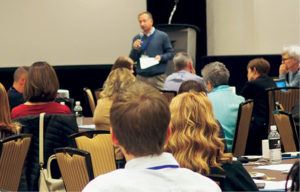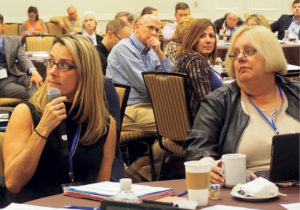November 1–4, 2018 | Denver, Colorado

The Council of Bar Admission Administrators (CBAA) held its Fall Meeting at the JW Marriott Denver Cherry Creek in Denver, Colorado, on November 1–4, 2018. Forty jurisdictions were represented by 90 attendees.

Marilyn Wellington (MA), Christopher Ryan (CO)
Attendees were welcomed to the meeting on Friday morning by CBAA Chair Marilyn J. Wellington of Massachusetts and Christopher Ryan, State Court Administrator for the Colorado Judicial Branch. The 10 CBAA committees met throughout Friday morning and early afternoon, during which a wide variety of issues were discussed pertaining to character and fitness investigations, technology in bar exam administration, testing and test accommodations, and Uniform Bar Examination policies. Three plenary sessions were presented on Friday afternoon and Saturday morning.
NCBE President Judith A. Gundersen addressed attendees on Saturday morning to inform CBAA members about ongoing activities and initiatives at NCBE and other developments of interest to the bar admissions community. At the conclusion of the Fall Meeting, the CBAA held its business meeting, during which committee chairs reported on the committee meetings that had taken place and administrators announced news from their jurisdictions.

Testing Task Force Focus Group: Judy Gundersen (NCBE); Drew Wiley, Ph.D.,and Chad Buckendahl, Ph.D. (ACS Ventures); Marilyn Wellington (MA)
Testing Task Force focus group: On Friday afternoon, two representatives from ACS Ventures LLC (one of two independent research consulting firms selected by NCBE’s Testing Task Force to support its three-year study of the bar examination) held a focus group to gather feedback from CBAA members about the current use and perceptions of the bar examination. This marked the first in a series of stakeholder focus groups being conducted by ACS during Phase 1 of the Testing Task Force’s recently announced three-phase research plan.
The following three plenary sessions were presented during the CBAA Fall Meeting:
Explanations for the Increase in Testing Accommodations Requests: A Focus on ADHD and Anxiety

John Ranseen, Ph.D., Timothy Allen, Ph.D.
Two experts from the University of Kentucky discussed the nature and symptoms of ADHD and various anxiety disorders and explored possible causes for the steady increase in such diagnoses in recent years. The speakers observed that several factors have converged to contribute to the current state of affairs—such as the loosening of diagnostic standards, an increasing prevalence of people being given clinical diagnoses of ADHD and other conditions, an increasing number of students with a history of accommodations, and a less stringent view of “disability” as reflected in Department of Justice regulations issued in 2016 pertaining to the ADA Amendments Act of 2008. Among the other issues addressed by the two speakers were the lack of a formal review process among colleges and professional schools for accommodations requests from students, typical problems in ADHD documentation, and a recent trend in cases with multiple diagnoses (among them anxiety, depression, bipolar disorder, autism spectrum disorder).
(Speakers: Timothy Allen, Ph.D., Psychiatrist and Associate Professor, University of Kentucky; John Ranseen, Ph.D., Clinical Psychologist and Associate Professor, University of Kentucky)
What Bar Admission Administrators Need to Know about Cybersecurity

Kent Brye (NCBE), Bradley Skolnik (IN, moderator)
How are cyberattacks typically conducted, by whom, and for what reasons? How can organizations protect their systems, networks, and programs from digital attacks, thereby ensuring the integrity, confidentiality, and availability of their information? This session addressed best practices for minimizing cybersecurity threats and mitigating risks in the event of a security breach, such as engaging in internal audits and periodic testing, and establishing a critical incident response team to respond to security incidents.
(Speaker: Kent Brye, Director of Information Technology, NCBE)
Using the Internet in Character and Fitness Investigations

Sophie Martin (NM), Keith Wilkinson (MI)
Metasearch engines, people search engines, deep web resources, social media tools, web search tools, and more—representatives from two jurisdictions shared strategies and tips for maximizing the Internet to effectively verify or validate information provided on character and fitness applications, discover information omitted by applicants, or investigate newly discovered leads.
(Speakers: Sophie Martin, Executive Director, New Mexico Board of Bar Examiners; Keith Wilkinson, Assistant Manager, Character and Fitness, State Bar of Michigan)
Denver in Photos
![Bradley W. Skolnik (IN), Marilyn J. Wellington (MA), Kathleen B. Harrington (CT), Sahbra Smook Jacobs (NJ) (not pictured: Emily J. Eschweiler [MN])](https://thebarexaminer.ncbex.org/wp-content/uploads/2019/02/CBAA_Denver110318_423-300x129.jpg)
2017–2018 CBAA Executive Committee: Bradley W. Skolnik (IN), Marilyn J. Wellington (MA), Kathleen B. Harrington (CT), Sahbra Smook Jacobs (NJ), (not pictured: Emily J. Eschweiler [MN])

Astrid Cariani (TN)

Meeting attendees participating in the Testing Task Force focus group

Meeting attendees participating in the Testing Task Force focus group

Rochelle Kaui (HI), Wadner Oge (MA). Back row: Tina Hopson (IN)

Allan Cook (TX)

Spencer Parr (IN), Mark Huntsberger (FL)

Jessica Crawley, JoAnne Dionese (both CO)

Elsie-Mae King, Elbert Joseph (both VI)

April Shaheen (TX)







